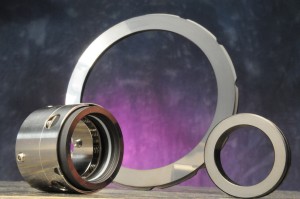Oct 8 2008
From petroleum to food and beverage to pharmaceuticals, most industries use mechanical pumps, and all these pumps rely on seals to reduce leaks and maintenance costs. Argonne researchers, along with industry partners, have developed a new, efficient and cost-effective alternative to conventional seals.
 These ultrananocrystalline diamond-coated pump seals garnered one of Argonne's two 2008 R&D 100 awards, which recognize the most important inventions in the previous year. Photo by George Joch.
These ultrananocrystalline diamond-coated pump seals garnered one of Argonne's two 2008 R&D 100 awards, which recognize the most important inventions in the previous year. Photo by George Joch.
The surfaces of these Ultrananocrystalline-Diamond (UNCD) Mechanical Seals are specially treated with a continuous film of tiny diamonds. This diamond coating improves the pumps' reliability, durability and ability to prevent fluids from escaping into the environment. UNCD is an engineered nanomaterial invented at Argonne. It consists of diamond grains two to five nanometers in diameter.
For their work on the innovative mechanical pump seals, Argonne scientists and their industrial partners received an R&D 100 award this summer. The award is Argonne's 101st since the R&D 100s were introduced by R&D magazine in 1964. Dubbed the "Oscars of innovation" by the Chicago Tribune, the award indicates that a product represents one of the most innovative inventions of the year, according to R&D magazine.
Scientists have known about the advantages of diamond-based products for a long time, but diamonds are generally difficult to synthesize as small films and are even harder to integrate with other materials. To make a difference in manufacturing, any new mechanical pump seals would have to be priced to compete with the less-efficient silicon-carbide seals they would replace.
“I think that's a big part of what makes this such a huge breakthrough,” said John Hryn, principal process development engineer at Argonne. “We not only managed to integrate UNCD with the pump seal, but we also made it in a way where it could be manufactured at a large production facility and would be cost-effective for those who would want to use it.”
Argonne developed the UNCD thin film production technology in 2002 with partner iplas GmbH, near Cologne, Germany. This technology won an R&D 100 Award in 2003. UNCD marked the first-ever affordable diamond film suitable for mass production of a wide range of diamond-based microelectromechanical systems, nanoelectromechanical system devices, biodevices, biosensors and microelectronic circuits. Adjustments in the original production process made UNCD cost-effective for mechanical seals.
The UNCD Mechanical Seals were jointly developed by a team from Argonne, Advanced Diamond Technologies, Inc., (ADT), Romeoville, Ill., and John Crane Inc., Morton Grove, Ill. The Argonne team included John Hryn, lead development engineer, Gregory Krumdick, engineer, Jeffrey Elam, chemist, and Joseph Libera, engineer and post-doctoral appointee. The ADT contributors included Charles West, vice president of engineering, James Netzel, director of seals engineering, and John Carlisle, chief technical officer, and Orlando Auciello, ADT technical consultant and Argonne senior physicist. The John Crane team included Douglas Volden, new products director, Joe Haas, vice president of engineering, and Rick Page, vice president of marketing.
The Industrial Technologies Program of the U.S. Department of Energy's Office of Energy Efficiency and Renewable Energy provided funding for the development of the UNCD Mechanical Seals. The Industrial Technologies Program works with U.S. industry to improve industrial energy efficiency and environmental performance. The program invests in high-risk, high-value R&D to reduce industrial energy use while stimulating productivity and growth.
ADT, an Argonne spin-off company, has developed a commercial manufacturing platform for making UNCD Seals in volume with exceptional reproducibility and quality. John Crane, the world's largest manufacturer of seals and associated products, performed exhaustive tests to show that the UNCD-enhanced seals significantly reduce friction, which improves their performance compared to seals made with conventional materials.